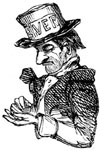
Should Catholics Canonize Ebenezer Scrooge?
"I WAS HUNGRY & YOU SENT ME TO A HAIRSTYLIST"
In recent years Catholics of a conservative political bent have taken to proclaiming far and wide the compatibility of Catholic social teaching and free-market capitalism. In much the same way as the ecclesiastical Left has jettisoned Catholic teachings on sexual ethics as “outdated,” those on the Right now tell us that the traditional Catholic teachings on social justice, which take a very dim view of unbridled capitalism, are “outmoded.” Such doctrines, they explain, were forged in a “narrow” European setting which gave them a certain bias that failed to reflect the supposedly more benign experience of market capitalism in the U.S. They assure us that Pope John Paul II — to his great credit, given the hidebound strictures of his own “Polish experience” — has been set straight by neoconservative sages, and has at last seen the light and put his apostolic blessing on The American Way. Leo XIII is out, Limbaugh is in as the authentic interpreter of Catholic social teaching.
One of the most active and increasingly visible promoters of the new Catholic laissez faire is the Acton Institute for the Study of Religion and Liberty headquartered in Grand Rapids, Michigan. Named for 19th-century British historian Lord Acton, the institute sponsors lectures and seminars, funds fellowships, and distributes literature promoting the principles of classical liberalism. The institute also publishes a bimonthly periodical, Religion and Liberty, which contains interviews, book reviews, and a regular feature called “In the Liberal Tradition,” a profile of some historically noteworthy philosopher, theologian, or scholar whose writings are cited as supporting the free market or laissez-faire position. It bears noting that the term “liberal” is used by the Actonites in its historically accurate sense of one who favors the liberation of economic forces from state control or political interference.
Historical figures profiled in Religion and Liberty have included Jesuit Francisco Suarez, Swiss philosopher Benjamin Constant, and a 19th-century Church of Ireland (Anglican) Archbishop of Dublin, Richard Whately. Whately is identified as “the most able of the Whig ecclesiastics,” whose talents were recognized by his appointment as Archbishop of Dublin in 1831, a position he held until his death in 1863. As Archbishop he also held a seat in the House of Commons, where he showed great interest in the issues of revision of the criminal law, education, and the emancipation of the Jews. But Religion and Liberty is most interested in his economic writings, which include Easy Lessons on Money Matters for the Use of Young People. Throughout Whately’s career, we are told, he was a “champion of the free market system, insisting it was the best economic philosophy.” An illustrative quote from Whately, summing up the essence of the laissez-faire approach, caps off the profile: “The best way is to leave all laborers and employers, as well as all other sellers and buyers, free to ask and to offer what they think fit.”
You May Also Enjoy
He dissents from a basic moral principle of Judeo-Christian, Catholic social teaching: that superfluous wealth must be shared with the poor.
The social basis of our culture is bureaucratic consumer capitalism centered on the autonomous individual and generally hostile to older ideas of moral order.
In an effort to attract moderates, the Pennsylvania senator capitulated on every key point dear to conservatives -- and was voted out of office.

